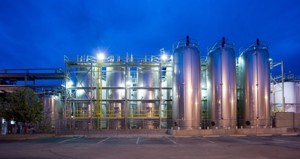Novozymes cuts jobs, says US policy, Monsanto deal pose risks
COPENHAGEN (Reuters) -- Enzymes maker Novozymes will cut 198 jobs and invest more in emerging markets, it said on Wednesday, adding it could time take to recapture past growth rates amid uncertainty over US renewable energy policy and the takeover of a key partner.
The Danish company's business flourished after being spun off from drugmaker Novo Nordisk in 2000, but a lower oil price in recent years has hit demand for its enzymes used in detergents, animal feed and in the production of biofuel.
Its shares rose more than 5% in early trading after it posted slightly better than expected fourth-quarter earnings and announced a share buyback program worth up to $287 million.
But they had reversed to trade down 4.4% at 241.90 crowns by 1250 GMT.
"This is a new reality for Novozymes," Chief Executive Peder Holk Nielsen told Reuters, referring to the job cuts and adding he "could no longer rely on growth to take us through the difficulties."
Novozymes, which had 6,441 employees at the end of 2016, said it would increase investment in innovation and expand in South East Asia, Africa and the Middle East, but that would take time to boost revenues.
For 2017, the company expects organic sales growth - stripping out currency moves -- of 2-5%. Last year, it cut its long-term organic sales growth expectations to 6-7% a year for 2017-2020, down from 8-10% before.
Nielsen did not set any longer-term targets on Wednesday, but said products launched in 2018-2020 would help return to historic growth rates.
He said Bayer's takeover of key partner Monsanto could extend the market for Novozymes' smart microbial crop-boosting products, known as inoculants, but acknowledged "transactional risks" from the deal.
"There's a risk that the huge focus Monsanto has had on biological solutions will be less at Bayer," he said. "That's not our expectation, but we don't know until the transaction is finalized."
He also said the US market for biofuels faced uncertainty, as incoming US President Donald Trump could scale back a program designed cut greenhouse gas emissions that requires energy firms to blend ethanol and biodiesel into gasoline and diesel.
"My sense is that even if they remove the entire legislation on bioethanol, consumption in the United States will still be high, although probably a little less that today," Nielsen said.
Reporting by Jacob Gronholt-Pedersen and Teis Jensen; Additional reporting Nikolaj Skydsgaard; Editing by Mark Potter







Comments